RocketMQ-Namesrv源码解析
Posted chenzuyibao
tags:
篇首语:本文由小常识网(cha138.com)小编为大家整理,主要介绍了RocketMQ-Namesrv源码解析相关的知识,希望对你有一定的参考价值。
前言
版本:RocketMQ4.4.0
RocketMQ架构
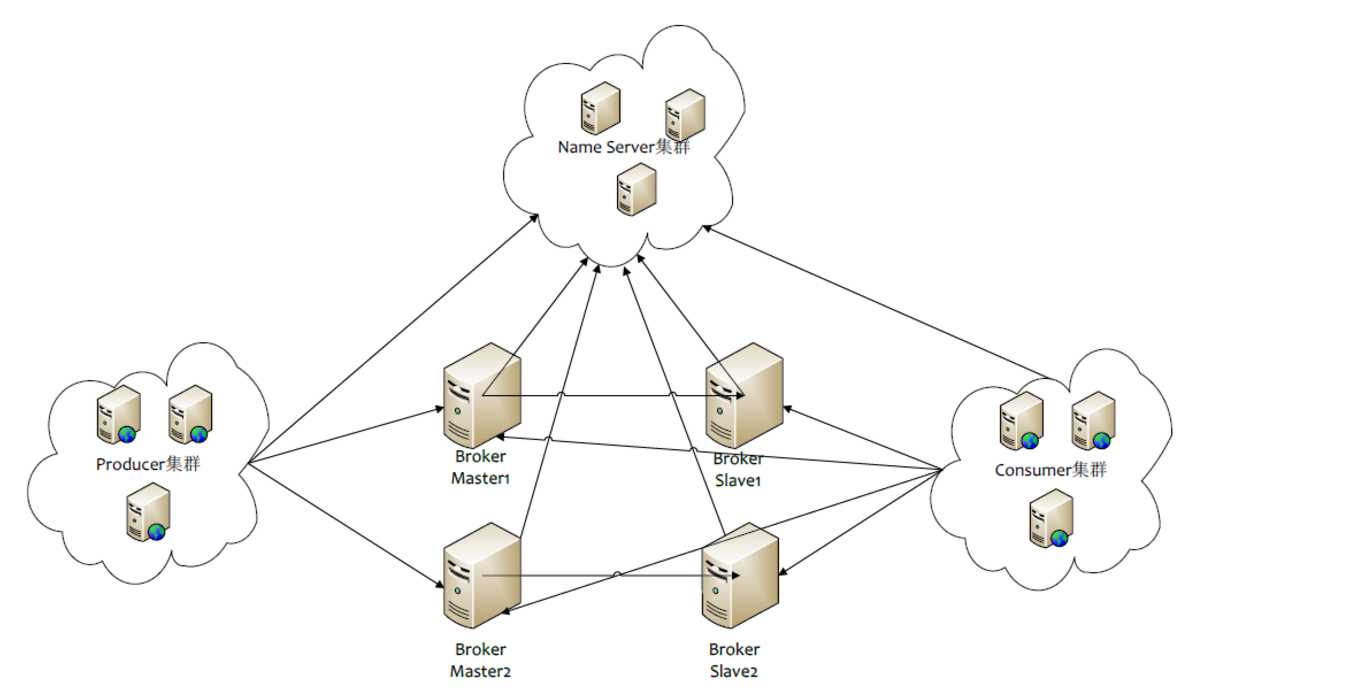
摘自《RocketMQ开发手册》
- Name Server是一个几乎无状态节点,可集群部署,节点之间无任何信息同步。
- Broker部署相对复杂,Broker分为Master和Slave,一个Master可以对应多个Slave,但是一个Slave只能对应一个Master,Master和Slave的对应关系通过指定相同的BrokerName,不同的BrokerId来定义,BrokerId为0表示Master,非0 表示Slave。Master也可以部署多个。每个Broker与NameServer集群中的所有节点建立长连接,定时注册Topic信息到所有NameServer。
- Producer和Name Server集群中的其中一个节点(随机选择)建立长连接,定期从Name Server获取Topic路由信息,并向提供Topic服务的Master建立长连接,且定时向Master发送心跳。Producer完全无状态,可集群部署。
- Consumer与Name Server集群中的其中一个节点(随机选择)建立长连接,定期从Name Server获取Topic路由信息,并向提供Topic服务的Master、Slave建立长连接,且定时向Master、Slave发送心跳。Consumer既可以从Master订阅消息,也可以从Slave订阅消息,订阅规则由Broker配置决定。
NameSrv集群是一个无状态节点,维护Broker注册的Topic信息,将向生产者和消费者提供Topic路由信息。
问题
看了RocketMQ架构,我们也大概了解了namesrv的作用,那么也产生了两个问题:
- Broker注册信息,注册了哪些信息?也就是namesrv维护了集群中的哪些信息?
- 由Broker定时上报注册信息,那么在Broker宕机时,无法注册信息,那么namesrv是如何处理已宕机的broker?
那么下面将进行阅读源码来解决这两个疑问。
Namesrv
RocketMQ包含的组件
- NameServer:单点,供Producer和Consumer获取Broker地址
- Producer:产生并发送消息
- Consumer:接收并消费消息
- Broker:消息存储,消息转发
namesrv组件
作用:Producer和Consumer获取Broker的地址。
目的:解耦Broker和Producer、Consumer。
原理:使用netty作为通信工具,监听指定端口,如果是broker注册,将broker的信息保存在内存中并保存到文件中,producer和consumer获取broker地址的请求
namesrv包结构说明
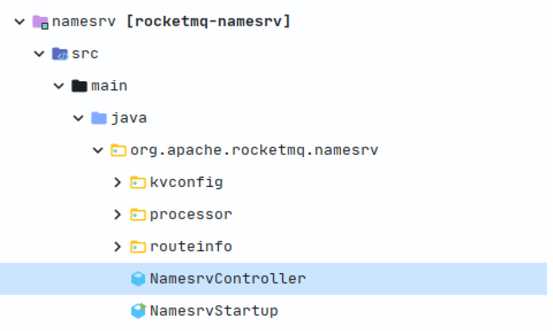
- NamesrvStartup为启动入口
- NamesrvController为启动控制器
- kvconfig为kv配置管理器
- processor为请求处理器,处理接收到的请求
- routeinfo为netty中实际存储路由信息的管理器/容器
NamesrvController包含的组件
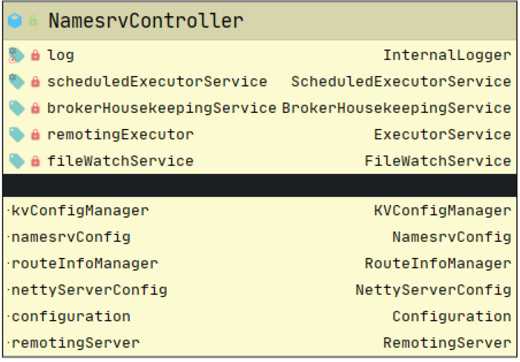
- namesrvConfig:nameServer的配置
- nettyServerConfig:NameServer的netty配置
- remotingServer:NameServer 的netty服务器
- scheduledExecutorService:routeInfoManager和kvConfigManager使用的定时线程池
- remotingExecutor:netty使用的线程池
- brokerHosekeppingService:
- kvConfigManager:kv配置管理
- routeInfoManager:包含broker的ip和对应的队列信息,说明producer可以往哪一个broker发送消息,consumer从哪一个broker pull消息。
- fileWatchService:文件监控线程(4.3.0以上才拥有此功能)
NameServer启动
NamesrvStartup.main(0)
public static void main(String[] args) {
main0(args);
}
public static NamesrvController main0(String[] args) {
try {
NamesrvController controller = createNamesrvController(args);
start(controller);
String tip = "The Name Server boot success. serializeType=" + RemotingCommand.getSerializeTypeConfigInThisServer();
log.info(tip);
System.out.printf("%s%n", tip);
return controller;
} catch (Throwable e) {
e.printStackTrace();
System.exit(-1);
}
return null;
}
public static NamesrvController createNamesrvController(String[] args) throws IOException, JoranException {
System.setProperty(RemotingCommand.REMOTING_VERSION_KEY, Integer.toString(MQVersion.CURRENT_VERSION));
//PackageConflictDetect.detectFastjson();
Options options = ServerUtil.buildCommandlineOptions(new Options());
commandLine = ServerUtil.parseCmdLine("mqnamesrv", args, buildCommandlineOptions(options), new PosixParser());
if (null == commandLine) {
System.exit(-1);
return null;
}
//1. NamesrvConfig配置
final NamesrvConfig namesrvConfig = new NamesrvConfig();
//2. 解析命令行参数,NettyServerConfig配置
final NettyServerConfig nettyServerConfig = new NettyServerConfig();
//配置监听端口
nettyServerConfig.setListenPort(9876);
if (commandLine.hasOption(‘c‘)) {
String file = commandLine.getOptionValue(‘c‘);
if (file != null) {
InputStream in = new BufferedInputStream(new FileInputStream(file));
properties = new Properties();
properties.load(in);
//读取properties文件,加载数据到内存对象中
MixAll.properties2Object(properties, namesrvConfig);
MixAll.properties2Object(properties, nettyServerConfig);
namesrvConfig.setConfigStorePath(file);
System.out.printf("load config properties file OK, %s%n", file);
in.close();
}
}
if (commandLine.hasOption(‘p‘)) {
InternalLogger console = InternalLoggerFactory.getLogger(LoggerName.NAMESRV_CONSOLE_NAME);
MixAll.printObjectProperties(console, namesrvConfig);
MixAll.printObjectProperties(console, nettyServerConfig);
System.exit(0);
}
MixAll.properties2Object(ServerUtil.commandLine2Properties(commandLine), namesrvConfig);
if (null == namesrvConfig.getRocketmqHome()) {
System.out.printf("Please set the %s variable in your environment to match the location of the RocketMQ installation%n", MixAll.ROCKETMQ_HOME_ENV);
System.exit(-2);
}
//3. logback配置
LoggerContext lc = (LoggerContext) LoggerFactory.getILoggerFactory();
JoranConfigurator configurator = new JoranConfigurator();
configurator.setContext(lc);
lc.reset();
configurator.doConfigure(namesrvConfig.getRocketmqHome() + "/conf/logback_namesrv.xml");
log = InternalLoggerFactory.getLogger(LoggerName.NAMESRV_LOGGER_NAME);
MixAll.printObjectProperties(log, namesrvConfig);
MixAll.printObjectProperties(log, nettyServerConfig);
//4. NamesrvController初始化,initialize
final NamesrvController controller = new NamesrvController(namesrvConfig, nettyServerConfig);
// remember all configs to prevent discard
// 将读取的配置导入,防止丢失
controller.getConfiguration().registerConfig(properties);
return controller;
}
public static NamesrvController start(final NamesrvController controller) throws Exception {
if (null == controller) {
throw new IllegalArgumentException("NamesrvController is null");
}
boolean initResult = controller.initialize();
if (!initResult) {
controller.shutdown();
System.exit(-3);
}
Runtime.getRuntime().addShutdownHook(new ShutdownHookThread(log, new Callable<Void>() {
@Override
public Void call() throws Exception {
controller.shutdown();
return null;
}
}));
controller.start();
return controller;
}
说明:
- NamesrvConfig配置
- 解析命令行参数,NettyServerConfig配置
- logback配置
- 创建NamesrvController并初始化参数。
- NamesrvStartup.start()
- NamesrvController.initialize()
- 注册shutdown钩子
- NamesrvController.start()
NamesrvController.initialize()
public boolean initialize() {
//1. KVConfigManager.load加载原来的key-value文件到内存中
this.kvConfigManager.load();
//2. 初始化NettyRemotingServer
this.remotingServer = new NettyRemotingServer(this.nettyServerConfig, this.brokerHousekeepingService);
//3. 初始化nettyRomote线程池,默认8个,该线程池中队列为LinkedBlockingQueue,为无界队列
this.remotingExecutor =
Executors.newFixedThreadPool(nettyServerConfig.getServerWorkerThreads(), new ThreadFactoryImpl("RemotingExecutorThread_"));
//4. 注册requestProcessor,默认为DefaultRequestProcessor,用来处理netty接收到的信息
this.registerProcessor();
//5. 启动定时线程,延迟5秒执行,每隔10s判断broker是否依然存活
this.scheduledExecutorService.scheduleAtFixedRate(new Runnable() {
@Override
public void run() {
NamesrvController.this.routeInfoManager.scanNotActiveBroker();
}
}, 5, 10, TimeUnit.SECONDS);
//6. 启动定时线程,延迟1秒执行,每隔10min打印出所有k-v
this.scheduledExecutorService.scheduleAtFixedRate(new Runnable() {
@Override
public void run() {
NamesrvController.this.kvConfigManager.printAllPeriodically();
}
}, 1, 10, TimeUnit.MINUTES);
if (TlsSystemConfig.tlsMode != TlsMode.DISABLED) {
// Register a listener to reload SslContext
try {
fileWatchService = new FileWatchService(
new String[]{
TlsSystemConfig.tlsServerCertPath,
TlsSystemConfig.tlsServerKeyPath,
TlsSystemConfig.tlsServerTrustCertPath
},
new FileWatchService.Listener() {
boolean certChanged, keyChanged = false;
@Override
public void onChanged(String path) {
if (path.equals(TlsSystemConfig.tlsServerTrustCertPath)) {
log.info("The trust certificate changed, reload the ssl context");
reloadServerSslContext();
}
if (path.equals(TlsSystemConfig.tlsServerCertPath)) {
certChanged = true;
}
if (path.equals(TlsSystemConfig.tlsServerKeyPath)) {
keyChanged = true;
}
if (certChanged && keyChanged) {
log.info("The certificate and private key changed, reload the ssl context");
certChanged = keyChanged = false;
reloadServerSslContext();
}
}
private void reloadServerSslContext() {
((NettyRemotingServer) remotingServer).loadSslContext();
}
});
} catch (Exception e) {
log.warn("FileWatchService created error, can‘t load the certificate dynamically");
}
}
return true;
}
说明:
- KVConfigManager.load加载原来的key-value文件到内存中
- 初始化NettyRemotingServer
- 初始化nettyRomote线程池,默认8个
- 注册requestProcessor,默认为DefaultRequestProcessor,用来处理netty接收到的信息
- 启动定时线程,延迟5秒执行,每隔10s扫描未活动的Broker,这个是否用于解决问题2
- 启动定时线程,延迟1秒执行,每隔10min打印出所有k-v
NamesrvController.start()
启动netty server
public void start() throws Exception {
this.remotingServer.start();
if (this.fileWatchService != null) {
this.fileWatchService.start();
}
}
启动Netty服务端
public void start() {
this.defaultEventExecutorGroup = new DefaultEventExecutorGroup(
nettyServerConfig.getServerWorkerThreads(),
new ThreadFactory() {
private AtomicInteger threadIndex = new AtomicInteger(0);
@Override
public Thread newThread(Runnable r) {
return new Thread(r, "NettyServerCodecThread_" + this.threadIndex.incrementAndGet());
}
});
ServerBootstrap childHandler =
this.serverBootstrap.group(this.eventLoopGroupBoss, this.eventLoopGroupSelector)
.channel(useEpoll() ? EpollServerSocketChannel.class : NioserverSocketChannel.class)
.option(ChannelOption.SO_BACKLOG, 1024)
.option(ChannelOption.SO_REUSEADDR, true)
.option(ChannelOption.SO_KEEPALIVE, false)
.childOption(ChannelOption.TCP_NODELAY, true)
.childOption(ChannelOption.SO_SNDBUF, nettyServerConfig.getServerSocketSndBufSize())
.childOption(ChannelOption.SO_RCVBUF, nettyServerConfig.getServerSocketRcvBufSize())
.localAddress(new InetSocketAddress(this.nettyServerConfig.getListenPort()))
.childHandler(new ChannelInitializer<SocketChannel>() {
@Override
public void initChannel(SocketChannel ch) throws Exception {
ch.pipeline()
.addLast(defaultEventExecutorGroup, HANDSHAKE_HANDLER_NAME,
new HandshakeHandler(TlsSystemConfig.tlsMode))
.addLast(defaultEventExecutorGroup,
new NettyEncoder(),
new NettyDecoder(),
new IdleStateHandler(0, 0, nettyServerConfig.getServerChannelMaxIdleTimeSeconds()),
new NettyConnectManageHandler(),
new NettyServerHandler()
);
}
});
if (nettyServerConfig.isServerPooledByteBufAllocatorEnable()) {
childHandler.childOption(ChannelOption.ALLOCATOR, PooledByteBufAllocator.DEFAULT);
}
try {
ChannelFuture sync = this.serverBootstrap.bind().sync();
InetSocketAddress addr = (InetSocketAddress) sync.channel().localAddress();
this.port = addr.getPort();
} catch (InterruptedException e1) {
throw new RuntimeException("this.serverBootstrap.bind().sync() InterruptedException", e1);
}
if (this.channelEventListener != null) {
this.nettyEventExecutor.start();
}
this.timer.scheduleAtFixedRate(new TimerTask() {
@Override
public void run() {
try {
NettyRemotingServer.this.scanResponseTable();
} catch (Throwable e) {
log.error("scanResponseTable exception", e);
}
}
}, 1000 * 3, 1000);
}
对于RocketMQ使用Netty进行集群之间的通信,后面会有单独章节用于讲解该模块:RocketMQ-remoting。
NameServer处理信息
netty收到的所有消息都是org.apache.rocketmq.namesrv.processor.DefaultRequestProcessor.processRequest处理的,根据不同的RequestCode执行不同的操作。
public RemotingCommand processRequest(ChannelHandlerContext ctx,
RemotingCommand request) throws RemotingCommandException {
if (ctx != null) {
log.debug("receive request, {} {} {}",
request.getCode(),
RemotingHelper.parseChannelRemoteAddr(ctx.channel()),
request);
}
switch (request.getCode()) {
case RequestCode.PUT_KV_CONFIG:
return this.putKVConfig(ctx, request);
case RequestCode.GET_KV_CONFIG:
return this.getKVConfig(ctx, request);
case RequestCode.DELETE_KV_CONFIG:
return this.deleteKVConfig(ctx, request);
case RequestCode.QUERY_DATA_VERSION:
return queryBrokerTopicConfig(ctx, request);
case RequestCode.REGISTER_BROKER:// 注册borker信息
// 获取Broker的版本信息
Version brokerVersion = MQVersion.value2Version(request.getVersion());
if (brokerVersion.ordinal() >= MQVersion.Version.V3_0_11.ordinal()) {
// 3.0.11版本后的处理方式
return this.registerBrokerWithFilterServer(ctx, request);
} else {
// 3.0.11版本之前的处理方式
return this.registerBroker(ctx, request);
}
case RequestCode.UNREGISTER_BROKER:
return this.unregisterBroker(ctx, request);// 取消注册broker
case RequestCode.GET_ROUTEINTO_BY_TOPIC:
return this.getRouteInfoByTopic(ctx, request);// 根据topic获取路由信息,在producer发送消息和consumer在pull消息的时候的时候会从nameServer 中获取
case RequestCode.GET_BROKER_CLUSTER_INFO:
return this.getBrokerClusterInfo(ctx, request);
case RequestCode.WIPE_WRITE_PERM_OF_BROKER:
return this.wipeWritePermOfBroker(ctx, request);
case RequestCode.GET_ALL_TOPIC_LIST_FROM_NAMESERVER:
return getAllTopicListFromNameserver(ctx, request);
case RequestCode.DELETE_TOPIC_IN_NAMESRV:
return deleteTopicInNamesrv(ctx, request);
case RequestCode.GET_KVLIST_BY_NAMESPACE:
return this.getKVListByNamespace(ctx, request);
case RequestCode.GET_TOPICS_BY_CLUSTER:
return this.getTopicsByCluster(ctx, request);
case RequestCode.GET_SYSTEM_TOPIC_LIST_FROM_NS:
return this.getSystemTopicListFromNs(ctx, request);
case RequestCode.GET_UNIT_TOPIC_LIST:
return this.getUnitTopicList(ctx, request);
case RequestCode.GET_HAS_UNIT_SUB_TOPIC_LIST:
return this.getHasUnitSubTopicList(ctx, request);
case RequestCode.GET_HAS_UNIT_SUB_UNUNIT_TOPIC_LIST:
return this.getHasUnitSubUnUnitTopicList(ctx, request);
case RequestCode.UPDATE_NAMESRV_CONFIG:
return this.updateConfig(ctx, request);
case RequestCode.GET_NAMESRV_CONFIG:
return this.getConfig(ctx, request);
default:
break;
}
return null;
}
注册Broker
case RequestCode.REGISTER_BROKER:// 注册borker信息
// 获取Broker的版本信息
Version brokerVersion = MQVersion.value2Version(request.getVersion());
if (brokerVersion.ordinal() >= MQVersion.Version.V3_0_11.ordinal()) {
// 3.0.11版本后的处理方式
return this.registerBrokerWithFilterServer(ctx, request);
} else {
// 3.0.11版本之前的处理方式
return this.registerBroker(ctx, request);
}
org.apache.rocketmq.namesrv.processor.DefaultRequestProcessor#registerBrokerWithFilterServer
public RemotingCommand registerBrokerWithFilterServer(ChannelHandlerContext ctx, RemotingCommand request)
throws RemotingCommandException {
// 解析请求,获取RequestHeader
final RemotingCommand response = RemotingCommand.createResponseCommand(RegisterBrokerResponseHeader.class);
final RegisterBrokerResponseHeader responseHeader = (RegisterBrokerResponseHeader) response.readCustomHeader();
final RegisterBrokerRequestHeader requestHeader =
(RegisterBrokerRequestHeader) request.decodeCommandCustomHeader(RegisterBrokerRequestHeader.class);
if (!checksum(ctx, request, requestHeader)) {
response.setCode(ResponseCode.SYSTEM_ERROR);
response.setRemark("crc32 not match");
return response;
}
RegisterBrokerBody registerBrokerBody = new RegisterBrokerBody();
// 获取RegisterBrokerBody
if (request.getBody() != null) {
try {
registerBrokerBody = RegisterBrokerBody.decode(request.getBody(), requestHeader.isCompressed());
} catch (Exception e) {
throw new RemotingCommandException("Failed to decode RegisterBrokerBody", e);
}
} else {
registerBrokerBody.getTopicConfigSerializeWrapper().getDataVersion().setCounter(new AtomicLong(0));
registerBrokerBody.getTopicConfigSerializeWrapper().getDataVersion().setTimestamp(0);
}
// 注册Broker
RegisterBrokerResult result = this.namesrvController.getRouteInfoManager().registerBroker(
requestHeader.getClusterName(),
requestHeader.getBrokerAddr(),
requestHeader.getBrokerName(),
requestHeader.getBrokerId(),
requestHeader.getHaServerAddr(),
registerBrokerBody.getTopicConfigSerializeWrapper(),
registerBrokerBody.getFilterServerList(),
ctx.channel());
// 设置响应结果
responseHeader.setHaServerAddr(result.getHaServerAddr());
responseHeader.setMasterAddr(result.getMasterAddr());
byte[] jsonValue = this.namesrvController.getKvConfigManager().getKVListByNamespace(NamesrvUtil.NAMESPACE_ORDER_TOPIC_CONFIG);
response.setBody(jsonValue);
response.setCode(ResponseCode.SUCCESS);
response.setRemark(null);
return response;
}
对于netty通信这块这里不过多深究,我们知道由Broker发送过来的消息带有以下这些消息:
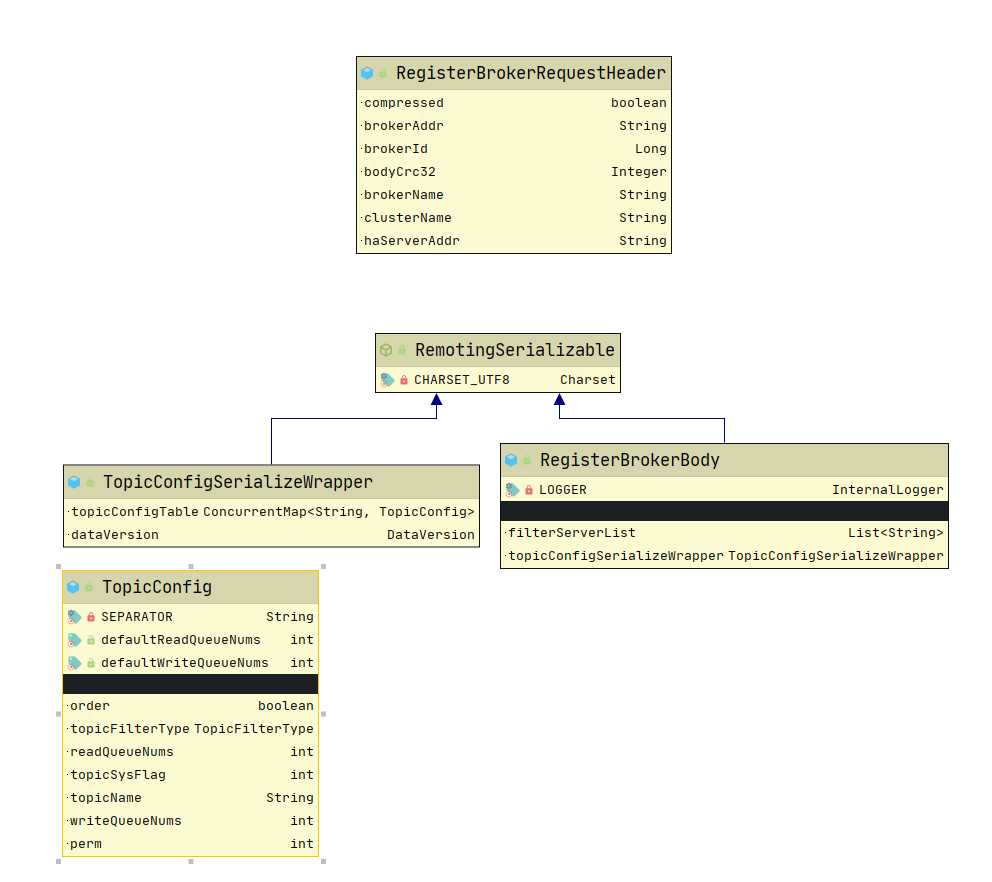
RouteInfoManager
org.apache.rocketmq.namesrv.routeinfo.RouteInfoManager
结构说明
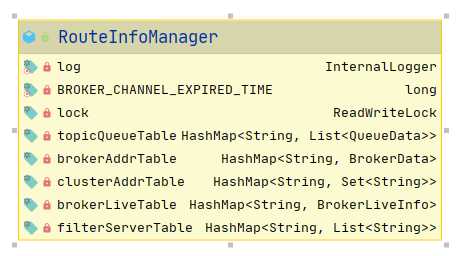
//topic队列信息
private final HashMap<String/* topic */, List<QueueData>> topicQueueTable;
//broker信息
private final HashMap<String/* brokerName */, BrokerData> brokerAddrTable;
//cluster信息
private final HashMap<String/* clusterName */, Set<String/* brokerName */>> clusterAddrTable;
//存活的broker信息
private final HashMap<String/* brokerAddr */, BrokerLiveInfo> brokerLiveTable;
//broker filter
private final HashMap<String/* brokerAddr */, List<String>/* Filter Server */> filterServerTable;
RouteInfoManager为管理Broker所注册的Topic路由信息和集群的信息。其实就是维护了相对应的几个Map
注册Broker:registerBroker
org.apache.rocketmq.namesrv.routeinfo.RouteInfoManager#registerBroker
public RegisterBrokerResult registerBroker(
final String clusterName,
final String brokerAddr,
final String brokerName,
final long brokerId,
final String haServerAddr,
final TopicConfigSerializeWrapper topicConfigWrapper,
final List<String> filterServerList,
final Channel channel) {
RegisterBrokerResult result = new RegisterBrokerResult();
try {
try {
// 获取写锁
this.lock.writeLock().lockInterruptibly();
// 获取该Cluster下的所有Broker,并添加该Broker
Set<String> brokerNames = this.clusterAddrTable.get(clusterName);
if (null == brokerNames) {
brokerNames = new HashSet<String>();
this.clusterAddrTable.put(clusterName, brokerNames);
}
brokerNames.add(brokerName);
// 是否第一次注册,标志位
boolean registerFirst = false;
// 获取该BrokerName的BrokerData信息
BrokerData brokerData = this.brokerAddrTable.get(brokerName);
if (null == brokerData) {
// 为空,第一次注册,构建信息存入
registerFirst = true;
brokerData = new BrokerData(clusterName, brokerName, new HashMap<Long, String>());
this.brokerAddrTable.put(brokerName, brokerData);
}
// 存入brokerAddrs信息,若oldAddr为null则为第一次put
String oldAddr = brokerData.getBrokerAddrs().put(brokerId, brokerAddr);
registerFirst = registerFirst || (null == oldAddr);
// 若TopicConfigSerializeWrapper不为空,该类为TopicConfig信息的包装类,方便传输
// 且该broker为主,即 brokerId==0
if (null != topicConfigWrapper
&& MixAll.MASTER_ID == brokerId) {
// 判断Broker的TopicConfig信息是否改变||第一注册Broker信息
if (this.isBrokerTopicConfigChanged(brokerAddr, topicConfigWrapper.getDataVersion()) || registerFirst) {
ConcurrentMap<String, TopicConfig> tcTable = topicConfigWrapper.getTopicConfigTable();
if (tcTable != null) {
for (Map.Entry<String, TopicConfig> entry : tcTable.entrySet()) {
// 填充topicQueueTable
this.createAndUpdateQueueData(brokerName, entry.getValue());
}
}
}
}
// 填充brokerLiveTable
BrokerLiveInfo prevBrokerLiveInfo = this.brokerLiveTable.put(brokerAddr,
new BrokerLiveInfo(
System.currentTimeMillis(),
topicConfigWrapper.getDataVersion(),
channel,
haServerAddr));
// 第一次注册
if (null == prevBrokerLiveInfo) {
log.info("new broker registered, {} HAServer: {}", brokerAddr, haServerAddr);
}
if (filterServerList != null) {
if (filterServerList.isEmpty()) {
this.filterServerTable.remove(brokerAddr);
} else {
this.filterServerTable.put(brokerAddr, filterServerList);
}
}
// 备机处理,获取Master地址,构建返回结果
if (MixAll.MASTER_ID != brokerId) {
String masterAddr = brokerData.getBrokerAddrs().get(MixAll.MASTER_ID);
if (masterAddr != null) {
BrokerLiveInfo brokerLiveInfo = this.brokerLiveTable.get(masterAddr);
if (brokerLiveInfo != null) {
result.setHaServerAddr(brokerLiveInfo.getHaServerAddr());
result.setMasterAddr(masterAddr);
}
}
}
} finally {
// 释放写锁
this.lock.writeLock().unlock();
}
} catch (Exception e) {
log.error("registerBroker Exception", e);
}
return result;
}
说明:
- 填充clusterAddrTable
- 填充brokerAddrTable
- 填充topicQueueTable
- 填充brokerLiveTable
- 填充filterServerTable
自此整个Broker的注册过程完结,其实就是填充这5个Map的过程。问题1答案也浮出水面。
如何处理未存活的Broker
Broker未存活的判断
- Broker和Namesrv的Channel通道发生close、excepiton、idle事件,namesrv端将调用onChannelDestroy进行处理
- Namesrv将启动一个定时线程每隔10s扫描已上报的brokerLiveTable中所有Broker信息是否已超时上报,默认超时为120s,若超时,调用onChannelDestroy进行处理。
BrokerHousekeepingService
org.apache.rocketmq.namesrv.routeinfo.BrokerHousekeepingService implement ChannelEventListener
在发生Channel Event时将回调该方法:
public class BrokerHousekeepingService implements ChannelEventListener {
private static final InternalLogger log = InternalLoggerFactory.getLogger(LoggerName.NAMESRV_LOGGER_NAME);
private final NamesrvController namesrvController;
public BrokerHousekeepingService(NamesrvController namesrvController) {
this.namesrvController = namesrvController;
}
@Override
public void onChannelConnect(String remoteAddr, Channel channel) {
}
@Override
public void onChannelClose(String remoteAddr, Channel channel) {
this.namesrvController.getRouteInfoManager().onChannelDestroy(remoteAddr, channel);
}
@Override
public void onChannelException(String remoteAddr, Channel channel) {
this.namesrvController.getRouteInfoManager().onChannelDestroy(remoteAddr, channel);
}
@Override
public void onChannelIdle(String remoteAddr, Channel channel) {
this.namesrvController.getRouteInfoManager().onChannelDestroy(remoteAddr, channel);
}
}
定时线程scanNotActiveBroker
org.apache.rocketmq.namesrv.NamesrvController#initialize
public boolean initialize() {
// ...省略代码
//5. 启动定时线程,延迟5秒执行,每隔10s判断broker是否依然存活
this.scheduledExecutorService.scheduleAtFixedRate(new Runnable() {
@Override
public void run() {
NamesrvController.this.routeInfoManager.scanNotActiveBroker();
}
}, 5, 10, TimeUnit.SECONDS);
// ...省略代码
return true;
}
org.apache.rocketmq.namesrv.routeinfo.RouteInfoManager#scanNotActiveBroker
public void scanNotActiveBroker() {
Iterator<Entry<String, BrokerLiveInfo>> it = this.brokerLiveTable.entrySet().iterator();
while (it.hasNext()) {
Entry<String, BrokerLiveInfo> next = it.next();
long last = next.getValue().getLastUpdateTimestamp();
if ((last + BROKER_CHANNEL_EXPIRED_TIME) < System.currentTimeMillis()) {
RemotingUtil.closeChannel(next.getValue().getChannel());
it.remove();
log.warn("The broker channel expired, {} {}ms", next.getKey(), BROKER_CHANNEL_EXPIRED_TIME);
this.onChannelDestroy(next.getKey(), next.getValue().getChannel());
}
}
}
若超时,也是调用onChannelDestroy方法进行移除路由信息
RouteInfoManager#onChannelDestroy
org.apache.rocketmq.namesrv.routeinfo.RouteInfoManager#onChannelDestroy
public void onChannelDestroy(String remoteAddr, Channel channel) {
// 获取BrokerAddr,注意remoteAddr是Broker与netty连接的地址,并不是Broker nettyServer所监听的地址
String brokerAddrFound = null;
if (channel != null) {
try {
try {
this.lock.readLock().lockInterruptibly();
Iterator<Entry<String, BrokerLiveInfo>> itBrokerLiveTable =
this.brokerLiveTable.entrySet().iterator();
while (itBrokerLiveTable.hasNext()) {
Entry<String, BrokerLiveInfo> entry = itBrokerLiveTable.next();
if (entry.getValue().getChannel() == channel) {
brokerAddrFound = entry.getKey();
break;
}
}
} finally {
this.lock.readLock().unlock();
}
} catch (Exception e) {
log.error("onChannelDestroy Exception", e);
}
}
if (null == brokerAddrFound) {
brokerAddrFound = remoteAddr;
} else {
log.info("the broker‘s channel destroyed, {}, clean it‘s data structure at once", brokerAddrFound);
}
if (brokerAddrFound != null && brokerAddrFound.length() > 0) {
try {
try {
this.lock.writeLock().lockInterruptibly();
// 1.移除brokerLiveTable
this.brokerLiveTable.remove(brokerAddrFound);
// 2.移除filterServerTable
this.filterServerTable.remove(brokerAddrFound);
String brokerNameFound = null;
boolean removeBrokerName = false;
// 3.移除brokerAddrTable
Iterator<Entry<String, BrokerData>> itBrokerAddrTable =
this.brokerAddrTable.entrySet().iterator();
while (itBrokerAddrTable.hasNext() && (null == brokerNameFound)) {
BrokerData brokerData = itBrokerAddrTable.next().getValue();
Iterator<Entry<Long, String>> it = brokerData.getBrokerAddrs().entrySet().iterator();
while (it.hasNext()) {
Entry<Long, String> entry = it.next();
Long brokerId = entry.getKey();
String brokerAddr = entry.getValue();
if (brokerAddr.equals(brokerAddrFound)) {
brokerNameFound = brokerData.getBrokerName();
it.remove();
log.info("remove brokerAddr[{}, {}] from brokerAddrTable, because channel destroyed",
brokerId, brokerAddr);
break;
}
}
if (brokerData.getBrokerAddrs().isEmpty()) {
removeBrokerName = true;
itBrokerAddrTable.remove();
log.info("remove brokerName[{}] from brokerAddrTable, because channel destroyed",
brokerData.getBrokerName());
}
}
// 4.移除clusterAddrTable
if (brokerNameFound != null && removeBrokerName) {
Iterator<Entry<String, Set<String>>> it = this.clusterAddrTable.entrySet().iterator();
while (it.hasNext()) {
Entry<String, Set<String>> entry = it.next();
String clusterName = entry.getKey();
Set<String> brokerNames = entry.getValue();
boolean removed = brokerNames.remove(brokerNameFound);
if (removed) {
log.info("remove brokerName[{}], clusterName[{}] from clusterAddrTable, because channel destroyed",
brokerNameFound, clusterName);
if (brokerNames.isEmpty()) {
log.info("remove the clusterName[{}] from clusterAddrTable, because channel destroyed and no broker in this cluster",
clusterName);
it.remove();
}
break;
}
}
}
// 5.移除topicQueueTable
if (removeBrokerName) {
Iterator<Entry<String, List<QueueData>>> itTopicQueueTable =
this.topicQueueTable.entrySet().iterator();
while (itTopicQueueTable.hasNext()) {
Entry<String, List<QueueData>> entry = itTopicQueueTable.next();
String topic = entry.getKey();
List<QueueData> queueDataList = entry.getValue();
Iterator<QueueData> itQueueData = queueDataList.iterator();
while (itQueueData.hasNext()) {
QueueData queueData = itQueueData.next();
if (queueData.getBrokerName().equals(brokerNameFound)) {
itQueueData.remove();
log.info("remove topic[{} {}], from topicQueueTable, because channel destroyed",
topic, queueData);
}
}
if (queueDataList.isEmpty()) {
itTopicQueueTable.remove();
log.info("remove topic[{}] all queue, from topicQueueTable, because channel destroyed",
topic);
}
}
}
} finally {
this.lock.writeLock().unlock();
}
} catch (Exception e) {
log.error("onChannelDestroy Exception", e);
}
}
}
日志
20:18:32.951 [NettyServerCodecThread_1] WARN RocketmqRemoting - NETTY SERVER PIPELINE: exceptionCaught 127.0.0.1:8078
20:18:32.960 [NettyServerCodecThread_1] WARN RocketmqRemoting - NETTY SERVER PIPELINE: exceptionCaught exception.
java.io.IOException: 远程主机强迫关闭了一个现有的连接。
at sun.nio.ch.SocketDispatcher.read0(Native Method) ~[na:1.8.0_111]
at sun.nio.ch.SocketDispatcher.read(SocketDispatcher.java:43) ~[na:1.8.0_111]
at sun.nio.ch.IOUtil.readIntoNativeBuffer(IOUtil.java:223) ~[na:1.8.0_111]
at sun.nio.ch.IOUtil.read(IOUtil.java:192) ~[na:1.8.0_111]
at sun.nio.ch.SocketChannelImpl.read(SocketChannelImpl.java:380) ~[na:1.8.0_111]
at io.netty.buffer.PooledUnsafeDirectByteBuf.setBytes(PooledUnsafeDirectByteBuf.java:221) ~[netty-all-4.0.42.Final.jar:4.0.42.Final]
at io.netty.buffer.AbstractByteBuf.writeBytes(AbstractByteBuf.java:899) ~[netty-all-4.0.42.Final.jar:4.0.42.Final]
at io.netty.channel.socket.nio.NioSocketChannel.doReadBytes(NioSocketChannel.java:275) ~[netty-all-4.0.42.Final.jar:4.0.42.Final]
at io.netty.channel.nio.AbstractNioByteChannel$NioByteUnsafe.read(AbstractNioByteChannel.java:119) ~[netty-all-4.0.42.Final.jar:4.0.42.Final]
at io.netty.channel.nio.NioEventLoop.processSelectedKey(NioEventLoop.java:652) ~[netty-all-4.0.42.Final.jar:4.0.42.Final]
at io.netty.channel.nio.NioEventLoop.processSelectedKeysOptimized(NioEventLoop.java:575) ~[netty-all-4.0.42.Final.jar:4.0.42.Final]
at io.netty.channel.nio.NioEventLoop.processSelectedKeys(NioEventLoop.java:489) ~[netty-all-4.0.42.Final.jar:4.0.42.Final]
at io.netty.channel.nio.NioEventLoop.run(NioEventLoop.java:451) ~[netty-all-4.0.42.Final.jar:4.0.42.Final]
at io.netty.util.concurrent.SingleThreadEventExecutor$2.run(SingleThreadEventExecutor.java:140) [netty-all-4.0.42.Final.jar:4.0.42.Final]
at java.lang.Thread.run(Thread.java:745) [na:1.8.0_111]
20:18:32.963 [NettyServerNIOSelector_3_1] INFO RocketmqRemoting - closeChannel: close the connection to remote address[127.0.0.1:8078] result: true
20:18:32.963 [NettyServerCodecThread_1] INFO RocketmqRemoting - NETTY SERVER PIPELINE: channelInactive, the channel[127.0.0.1:8078]
20:18:32.963 [NettyServerCodecThread_1] INFO RocketmqRemoting - NETTY SERVER PIPELINE: channelUnregistered, the channel[127.0.0.1:8078]
20:19:19.394 [NettyEventExecutor] INFO RocketmqNamesrv - the broker‘s channel destroyed, 192.168.72.1:10911, clean it‘s data structure at once
20:20:29.565 [NettyEventExecutor] INFO RocketmqNamesrv - remove brokerAddr[0, 192.168.72.1:10911] from brokerAddrTable, because channel destroyed
20:20:50.713 [NettyEventExecutor] INFO RocketmqNamesrv - remove brokerName[broker-a] from brokerAddrTable, because channel destroyed
20:21:34.787 [NettyEventExecutor] INFO RocketmqNamesrv - remove brokerName[broker-a], clusterName[DefaultCluster] from clusterAddrTable, because channel destroyed
20:21:36.033 [NettyEventExecutor] INFO RocketmqNamesrv - remove the clusterName[DefaultCluster] from clusterAddrTable, because channel destroyed and no broker in this cluster
20:21:56.126 [NettyEventExecutor] INFO RocketmqNamesrv - remove topic[broker-a QueueData [brokerName=broker-a, readQueueNums=1, writeQueueNums=1, perm=7, topicSynFlag=0]], from topicQueueTable, because channel destroyed
20:22:02.100 [NettyEventExecutor] INFO RocketmqNamesrv - remove topic[broker-a] all queue, from topicQueueTable, because channel destroyed
20:22:07.553 [NettyEventExecutor] INFO RocketmqNamesrv - remove topic[SELF_TEST_TOPIC QueueData [brokerName=broker-a, readQueueNums=1, writeQueueNums=1, perm=6, topicSynFlag=0]], from topicQueueTable, because channel destroyed
20:22:07.554 [NettyEventExecutor] INFO RocketmqNamesrv - remove topic[SELF_TEST_TOPIC] all queue, from topicQueueTable, because channel destroyed
20:22:07.554 [NettyEventExecutor] INFO RocketmqNamesrv - remove topic[TBW102 QueueData [brokerName=broker-a, readQueueNums=8, writeQueueNums=8, perm=7, topicSynFlag=0]], from topicQueueTable, because channel destroyed
20:22:07.554 [NettyEventExecutor] INFO RocketmqNamesrv - remove topic[TBW102] all queue, from topicQueueTable, because channel destroyed
20:22:07.554 [NettyEventExecutor] INFO RocketmqNamesrv - remove topic[BenchmarkTest QueueData [brokerName=broker-a, readQueueNums=1024, writeQueueNums=1024, perm=6, topicSynFlag=0]], from topicQueueTable, because channel destroyed
20:22:07.554 [NettyEventExecutor] INFO RocketmqNamesrv - remove topic[BenchmarkTest] all queue, from topicQueueTable, because channel destroyed
20:22:07.554 [NettyEventExecutor] INFO RocketmqNamesrv - remove topic[DefaultCluster QueueData [brokerName=broker-a, readQueueNums=16, writeQueueNums=16, perm=7, topicSynFlag=0]], from topicQueueTable, because channel destroyed
20:22:07.554 [NettyEventExecutor] INFO RocketmqNamesrv - remove topic[DefaultCluster] all queue, from topicQueueTable, because channel destroyed
20:22:07.554 [NettyEventExecutor] INFO RocketmqNamesrv - remove topic[OFFSET_MOVED_EVENT QueueData [brokerName=broker-a, readQueueNums=1, writeQueueNums=1, perm=6, topicSynFlag=0]], from topicQueueTable, because channel destroyed
20:22:07.554 [NettyEventExecutor] INFO RocketmqNamesrv - remove topic[OFFSET_MOVED_EVENT] all queue, from topicQueueTable, because channel destroyed
说明:
实质就是移除RouteInfoManager中的5个Map
总结
NameSrv集群是一个无状态节点,维护Broker注册的Topic信息,将向生产者和消费者提供Topic路由信息。
对于提出的两个问题:
问题1:RouteInfoManager中有5个Map用于存储Broker的路由信息。
问题2:Namesrv中两种方式来处理Broker异常的情况,一是使用netty的channel事件机制实现不同事件的回调处理方法,该方式主要为处理channel通道发生异常情况。二是使用一个定时线程检测最新上报时间是否已超时(120s),若超时则认为该Broker断掉。
以上是关于RocketMQ-Namesrv源码解析的主要内容,如果未能解决你的问题,请参考以下文章
片段(Java) | 机试题+算法思路+考点+代码解析 2023
Android 逆向类加载器 ClassLoader ( 类加载器源码简介 | BaseDexClassLoader | DexClassLoader | PathClassLoader )(代码片段